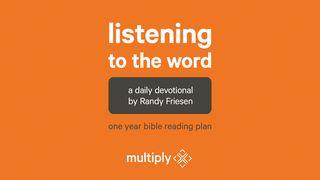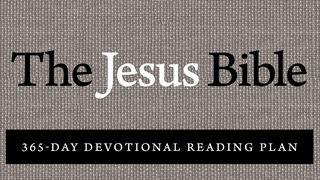For The Love Of GodSample

JEREMIAH 15 PROVIDES SOME OF the most haunting insights into the inner life and thought of the prophet Jeremiah:
(1) Jeremiah has been interceding with God on behalf of the covenant people (Jer 14). God tells Jeremiah to stop, that he will not listen (Jer. 14:11-12). Indeed, he now says that even if Moses and Samuel were to stand before him and intercede for the people, he would not spare them (Jer. 15:1). Centuries earlier Moses and Samuel had successfully interceded for Israel (Ex. 32:11-14; Num. 14:13-24; Deut. 9:18-20, 25-29; 1 Sam. 7:5-9; 12:19-25)—though it is important to remember that they also secured, in some measure, the willingness of the people to return to the Lord with contrition and renewed obedience. This Jeremiah has not been able to achieve. Now God is telling him that he will not achieve it: the people will go into captivity. The iniquity and idolatry under Manasseh have been the last straw (Jer. 15:4; see 2 Kings 21:10-15; 23:26; 24:3).
(2) In Jeremiah 15:10, Jeremiah frankly wishes he had never been born. The entire nation “strives and contends” with him. Everyone curses him, not because he has been corrupt in business, but because he faithfully conveys the word of the Lord. The Lord reassures him (Jer. 15:11-14; the best iron came “from the north,” from the Black Sea area, so this is a way of saying that Israel’s arms would be no match for those of the Babylonians). But that is part of Jeremiah’s anguish. One part of him wants justice, wants retribution for his persecutors (Jer. 15:15). That same part utterly delights in God’s words (Jer. 15:16a). Yet on the other hand, his allegiance to God and his words is precisely what isolates him from the people: “I sat alone because your hand was on me and you had filled me with indignation” (Jer. 15:17b). Some of his most virulent foes were his own relatives (cf. Matt. 10:36). Jeremiah is sometimes tempted to think that it is God who has failed, like an intermittent spring (a wadi, Jer. 15:18) that flows at times with life and blessing, and at other times provides nothing.
God’s response (Jer. 15:19-21) is that if Jeremiah proves utterly faithful in conveying his words, he will continue as God’s spokesman and will be preserved from the evil machinations of his opponents. But one point is nonnegotiable: “Let this people turn to you, but you must not turn to them” (Jer. 15:19b).
The deep tension between faithfulness to God and alienation from one’s own people is an unvarying constant in the ministry of faithful preachers assigned to a declining culture.
(1) Jeremiah has been interceding with God on behalf of the covenant people (Jer 14). God tells Jeremiah to stop, that he will not listen (Jer. 14:11-12). Indeed, he now says that even if Moses and Samuel were to stand before him and intercede for the people, he would not spare them (Jer. 15:1). Centuries earlier Moses and Samuel had successfully interceded for Israel (Ex. 32:11-14; Num. 14:13-24; Deut. 9:18-20, 25-29; 1 Sam. 7:5-9; 12:19-25)—though it is important to remember that they also secured, in some measure, the willingness of the people to return to the Lord with contrition and renewed obedience. This Jeremiah has not been able to achieve. Now God is telling him that he will not achieve it: the people will go into captivity. The iniquity and idolatry under Manasseh have been the last straw (Jer. 15:4; see 2 Kings 21:10-15; 23:26; 24:3).
(2) In Jeremiah 15:10, Jeremiah frankly wishes he had never been born. The entire nation “strives and contends” with him. Everyone curses him, not because he has been corrupt in business, but because he faithfully conveys the word of the Lord. The Lord reassures him (Jer. 15:11-14; the best iron came “from the north,” from the Black Sea area, so this is a way of saying that Israel’s arms would be no match for those of the Babylonians). But that is part of Jeremiah’s anguish. One part of him wants justice, wants retribution for his persecutors (Jer. 15:15). That same part utterly delights in God’s words (Jer. 15:16a). Yet on the other hand, his allegiance to God and his words is precisely what isolates him from the people: “I sat alone because your hand was on me and you had filled me with indignation” (Jer. 15:17b). Some of his most virulent foes were his own relatives (cf. Matt. 10:36). Jeremiah is sometimes tempted to think that it is God who has failed, like an intermittent spring (a wadi, Jer. 15:18) that flows at times with life and blessing, and at other times provides nothing.
God’s response (Jer. 15:19-21) is that if Jeremiah proves utterly faithful in conveying his words, he will continue as God’s spokesman and will be preserved from the evil machinations of his opponents. But one point is nonnegotiable: “Let this people turn to you, but you must not turn to them” (Jer. 15:19b).
The deep tension between faithfulness to God and alienation from one’s own people is an unvarying constant in the ministry of faithful preachers assigned to a declining culture.
Scripture
About this Plan

A daily devotional for discovering the riches of God's word: For the Love of God is a daily devotional designed to walk a person through the Bible in a year while assisting the reader in discovering the riches of God's Word. Our hope is that this daily devotional will deepen your understanding and appreciation of God's Word, for the love of God.
More
We would like to thank The Gospel Coalition for providing this plan. For more information, please visit: thegospelcoalition.org









